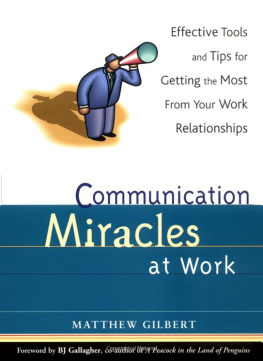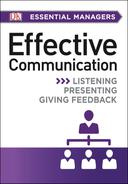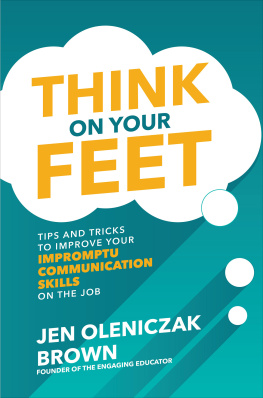
Advance Praise for Communication Miracles at Work
The workplace will be dramatically improved for everyone when they read Communication Mira-cles at Work. It provides a useful map to a relevant and important territory.
Michael Toms, co-founder of New Dimensions Radio, author of A Time for Choices and co-author of True Work
I wish Matthew Gilbert had written this book twenty years ago, because it's the only one that you really need to read if you are interested in creating communication miracles at work.
Gordon Wolf, Ph.D., organizational development consultant
Tired of biting your lip to make it through your workday? Matthew Gilbert uses his expertise to provide practical tips, clarifying perspectives, and illuminating anecdotes to help you use clear, open communication to cultivate a more humane, trusting work environment.
Carol L. McClelland, Ph.D., author of Changing Careers for Dummies
This book caused me to reevaluate the culture and communication within my own company. It's clearly written, at times inspirational, with take home points that I can use every day. I've made it required reading for every director in my organization. It gave me the impetus I needed to take us to the next level.
Harry Granito, Administrative Director, Department of Radiology, University of Michigan
Mr. Gilbert takes a refreshing look at one of the most important and sometimes overlooked problems in the workplace today. Communication Miracles at Work deserves a place on every manager and employer desk, right beside the Mission Statement and Business Plan.
Louis Mancuso, Projects Specialist, AT&T
This book is a concise yet sensitive blueprint for breakthroughs in communication in the workplace. It is a thoughtful presentation of sound principles that can only lead to significant gains for any organization.
Fred Ouweleen, Jr., President, Pacific Miniatures

Copyright 2002 by Mathew Gilbert
All Rights Reserved. No part of this book may be used or reproduced in any manner whatsoever without written permission, except in the case of brief quotations in critical articles or reviews. For information, contact:
Conari Press, 2550 Ninth Street, Suite 101, Berkeley, CA 94710-2551.
Conari Press books are distributed by Publishers Group West
Cover Illustration: Artville, Getty Inc.
Cover and Book Design: Suzanne Albertson
Author Photo: Nancy Quackenbush
LIBRARY OF CONGRESS CATALOGING-IN-PUBLICATION DATA
Gilbert, Matthew.
Communication miracles at work: effective tools and tips for getting the most from your work relationships/Matthew Gilbert.
p. cm.
Includes bibliographical references (p. 231) and index.
ISBN 1-57324-802-9
1. Communication in organizations. 2. Interpersonal communication. 3. Interpersonal relations. I. Title.
HD30.3.G527 2002
650.1'3dc21
2001007524
Printed in Canada.
02 03 04 05 TC 10 9 8 7 6 5 4 3 2 1
www.redwheelweiser.com
www.redwheelweiser.com/newsletter
Communication Miracles at Work
Organizations are no longer built on force. They are increasingly built on trust... this presupposes that people understand one another. Taking relationship responsibility is therefore an absolute necessity. It is a duty.
PETER DRUCKER, Management Challenges for the 21st Century
Foreword
Foreword by BJ Gallagher, co-author of What Would the Buddha Do at Work and A Peacock in the Land of Penguins
I n real estate, the three most important things are location, location, location. In organizational life, it's communication, communication, communication. Communication is everything. It is the number one challenge of groups both large and small. In my twenty years of experience consulting with businesses and conducting seminars, I have yet to work with a team, department, or company that didn't have communication problems. Wherever two or more people are gathered, the chance for miscommunication will be there. The more people involved, the more complex the problems.
Matthew Gilbert understands this. The thing I like best about his book, Communication Miracles at Work, is that it is both informative and practical. I like books that tell me something I need to know while also teaching me new skills. I like books that don't just outline a problem but suggest solutions as well.
The other thing I especially like about Gilbert's book is his emphasis on personal responsibility. I am responsible for my communication: for picking the right words and the most appropriate medium (face to face, phone, e-mail, memo, large meeting); for knowing my audience, gauging their receptivity, and speaking into their listening; and for enhancing the effectiveness of any communication by selecting the appropriate time and place as often as I can. Simply stated, improving communication at work starts with me. No matter where I am in my organization's hierarchy (even if I'm at the bottom!), I can take the initiative to make my communication with others more effective.
Work is first and foremost about relationshipswith bosses, coworkers, clients and customers, vendors, and others. And relationships are first and foremost about communicationlistening, speaking, solving problems, resolving conflicts, negotiating deals, articulating a vision, sharing values. If you're interested in building better relationships at work, if you're looking to understand others better and to have them understand you, then this insightful, well-written book is for you. If you're independently wealthy, don't have to work, and don't care about improving your relationships with others then this book is still for you... to give to a friend! I hope that you (or your friend) will get as much out of it as I did.
Introduction
It would be nice if people could get along and work together, but it's not going to happen.
EDEN, posted on the MSN.com Disgruntled Workers bulletin board
I don't have any recollection of any communication miracles at work. It sounds like a hopeless subject.
UNCLE WARREN
T he above two comments bluntly sum up the feelings many of us have about the possibility of our workplace lives ever becoming saner. Day in and day out, our jobs can feel like battle zones of conflict, confusion, and despair, and sometimes it's all we can do not to stand up on a chair and scream. Just think about poor Dilbert and his crazy-making coworkers. His is a made-up world, of course, but how different is it really from the place you work? We laugh about it, and that's a healthy thing to do. But in the grit of the moment, when someone isn't making sense or playing fair or is saying something that you just don't want to hear, the humor is hard to find. These interactions can happen at any time and they can take many different forms.
Reflect on your own job for a moment. Do you have permission to say what you truly mean? Are your contributions valued, or do you wonder if anyone knows you're even there? How about your boss? Is he or she easy to talk to? Does he or she make an effort to understand what you need? What if an order doesn't get filled or a report is misfiled? Are mistakes thoughtfully handled, or is there a trail of blame and guilt?
In each situation communication plays a vital role, and if that process breaks down in any way, if we aren't being heard or can't resolve a conflict or haven't been acknowledged for a job well done, then even a beloved job becomes the enemy, and Mondays become a day to dread. But if our workplace relationships are productive and harmonious, if we feel our problems are taken seriously and our humanity is valued, then we really start to love what we do, and work magically energizes us.
Next page










